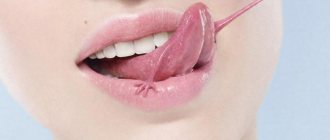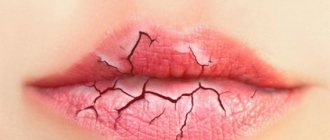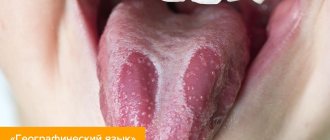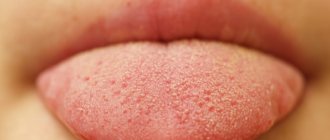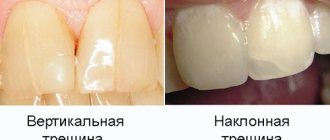At home, you can conduct a quick health diagnosis yourself. All that is necessary for this is to examine the tongue with a mirror. A change in its color and shape will tell you a lot about the functioning of internal organs. This simple method should not be neglected. With its help, you can prevent the development of dangerous pathologies in time. Some of them are indicated by a rough tongue.
Tongue is an indicator of health
It is recommended to examine the tongue in the morning, on an empty stomach. In a healthy person, its color is pale pink, and the taste buds are easily distinguishable. Normally, it has a faint whitish coating that can be easily removed with a toothbrush or a special scraper. The complete absence of such cover should be no less alarming than its excessive amount.
Any changes that occur in the oral cavity should attract a person’s attention. They may indicate the formation of pathological processes in the body. A decrease in the amount or complete cessation of saliva production leads to the development of severe dry mouth. A rough tongue will immediately signal this to a person, since due to a lack of moisture on its surface, difficulties will arise when swallowing and chewing food.
Dry tongue can occur with severe nervous excitement or stress. From a physiological point of view, this is a normal situation. As soon as the person calms down, saliva production returns to normal. If there have been no emotional upheavals, and dryness has been observed for a long time, you should look for other causes of a rough tongue. An experienced doctor will help in this situation.
The causes of dry tongue may be the following:
- dehydration and intoxication;
- heart pathologies;
- tongue burn;
- disorders of the gastrointestinal tract;
- glossitis;
- chronic tonsillitis;
- liver pathologies;
- stagnation of food;
- blood diseases;
- HIV;
- kidney problems;
- long-term use of antibiotics;
- inflammation of the salivary glands, as well as their malignant and benign tumors;
- diabetes;
- infectious lesions.
Despite the impressive list of pathologies that cause roughness and dryness of the tongue, diseases of the gastrointestinal tract, pulmonary system, and infections are most often diagnosed. Only a doctor can make a correct diagnosis after a thorough diagnosis. He will prescribe treatment that will help defeat the underlying disease. After this, the rough tongue will definitely return to normal.
Diseases as the cause of white plaque
If your tongue is always coated and your mouth smells bad, you should be wary. During an in-person examination, the doctor will examine the condition of the oral cavity and make a preliminary diagnosis. It is possible that the patient will have to undergo blood tests and undergo an ultrasound of the abdominal organs, because the most likely cause of the problem described is diseases of the gastrointestinal tract and liver. They are always the first to be excluded.
Among the pathologies in which the muscular organ becomes covered with a white coating that is difficult to remove:
- Glossitis. Inflammation of soft tissues, leading to changes in the color and structure of the tongue. Has a viral or bacterial nature. The patient experiences swelling, burning, pain when chewing and swallowing food. His diction is also impaired. In advanced cases, the pathology causes phlegmon of the neck.
- Gastritis. Acute or chronic inflammation of the mucous membranes of the stomach. Manifested by epigastric pain, dyspepsia, nausea, decreased performance. A “telling” symptom of gastritis is plaque on the organ of taste. It is associated with the pathological activity of pathogenic microflora.
- Candidiasis. Mycotic infection of the mouth caused by opportunistic yeast-like fungi Candida albicans. The mucous membranes swell and swell. They bake and crack. The lips begin to peel, and pockets form in their corners. The tongue and throat with thrush are very coated. It gets to the point where the kefir-like slurry can be easily removed with a brush or a teaspoon. But this does not help improve the situation, as soon its volume increases. This happens until medications are taken that destroy candida.
- Chlamydia. The pathology is sexually transmitted and, it would seem, should have nothing to do with oral health. However, in practice everything turns out differently. The violation provokes a sharp decrease in immunity. When the number of chlamydia increases greatly, the oral cavity becomes affected - a sticky white coating appears on its walls.
- Pneumonia. Whitish folds on the sides of the muscular organ most often indicate pathologies of the upper respiratory tract. They can be removed with a brush and paste, but they quickly return as the main provoking factor (pneumonia) continues to act.
- Chronic alcoholism. Alcohol addicts are diagnosed with multiple diseases of internal organs. After binge drinking, they are faced with a white tongue and an unpleasant aftertaste. In this case, the plaque caused by ethanol intoxication never reaches the tip of the tongue and is always localized at its root.
- Lung oncology. Cancer patients with lung damage often have a coated tongue.
The described symptom also occurs among pregnant women. The reason for this is a sharp change in hormonal levels. After childbirth, the situation returns to normal on its own.
Pathologies of the digestive tract
Reflexes that can influence the motor and secretory functions of the stomach and intestines are produced by tongue receptors. The opposite effect also occurs. That is, internal organs influence the appearance of pathological reflexes on the surface of the tongue. For example, its rough root and white coating will tell the doctor that the patient suffers from gastritis with low acidity. Pain and burning sensations in the esophagus, heartburn can complement the clinical picture.
A rough tongue covered with a gray coating may indicate the development of an intestinal ulcer. An additional factor indicating this pathology is heartburn and a burning sensation in the mouth.
Colitis, in addition to roughness, is characterized by an increase in the size of the tongue; teeth marks may even remain along its edges. With duodenitis and biliary dyskinesia, the thickness of the plaque increases significantly. A slight roughness of the tongue rarely causes discomfort. But a dense coating can negatively affect the sense of taste, reducing the sensitivity of the papillae.
Gastrointestinal diseases
Gastroenterologists know that white plaque can be a symptom of problems with the gastrointestinal tract. The surface of the mucous membrane is smooth and dry. This often happens with the development of gastritis with low acidity. This is a clear sign that inflammation has begun in the gastric mucosa. But a rough surface may indicate that the acidity of gastric juice has increased significantly.
Gastritis is easy to diagnose by symptoms such as heartburn, burning and pain in the esophagus and stomach. If the disease is chronic, the symptoms will not be as severe as in the acute form. Such patients often break into a sweat and feel general weakness.
The ulcer may cause plaque and red spots in the middle of the tongue. A duodenal ulcer causes a burning sensation, a feeling of heartburn.
White plaque may be a symptom of gastrointestinal problems.
Colitis and enterocolitis provoke the appearance of plaque at the base of the tongue. It swells quite a lot. Because of this, teeth marks can be seen along its edges. In such patients, bowel movements are disrupted, they complain of nausea and pain.
Diseases of the pulmonary system
A white, rough tongue occurs in patients at an early stage of the development of diseases of this organ. Inflammation in the bronchi is indicated by a thick and dry plaque located at its tip. If it begins to thicken and acquire a yellow tint, this will tell the doctor that the pathology is progressing. Additionally, the patient will experience other symptoms. For example, weakness, unpleasant odor and dry mouth.
Characteristic changes in the condition of the tongue are observed in pathologies such as scarlet fever. First, an extensive yellow or gray-white coating forms. It thickens every day. The fungiform papillae are clearly visible under the plaque. They are distinguished by a rich red color and are surrounded by a white border. After a week, the plaque disappears, and the tongue changes color to crimson.
Symptoms and manifestations
At the initial stage of development, there may be no characteristic symptoms of leukoplakia. Gradually, small white or gray lesions appear in the mouth - up to several millimeters. The surface of the altered areas is rough and hard. The mucous membranes around the lesion may appear unchanged and healthy.
The disease can spread to almost any part of the oral cavity. When lesions appear on the gums, discomfort and slight pain when chewing and brushing teeth may be added to the external symptom.
Typically, a visit to a doctor occurs when the lesion develops up to 2-4 cm and other manifestations of the disease occur: impaired taste perception, difficulty chewing, pain, repeated inflammation of areas of the mucous membrane.
Infectious and other diseases
There are many pathogenic fungi and bacteria in the oral cavity. Their growth is inhibited by the body's immune system. As soon as its operation fails, the infection begins its attack.
In humans, a rough tongue and a white coating on the tonsils may indicate the development of follicular or catarrhal tonsillitis. The disease is accompanied by a sore throat and fever. The causative agents of the disease are streptococci and staphylococci.
The culprit of oral thrush is the fungus Candida. A very dense white coating appears on the surface of the tongue. If you try to remove it, the mucous membrane underneath will begin to bleed. The development of this chronic pathology is observed in patients with HIV infection.
Dry tongue is accompanied by disruption of the thyroid gland. Symptoms such as sweating, loss of appetite, diarrhea, irritability and anxiety are observed.
Diabetes mellitus is characterized by the development of thirst, the patient’s tongue becomes rough and dry.
If dense white plaque is concentrated on its sides and tip, this may indicate the development of hidden renal failure. This is a very serious problem that can cause death. Therefore, if you notice such formations on your tongue, you should immediately consult a doctor.
The nature of white coating on the tongue
Unfortunately, white tongue is not always the norm.
Moreover, most often it indicates malfunctions in the functioning of internal organs. But this does not mean that all people who notice a light “mush” on the organ of taste should urgently rush to see a dentist or therapist. There are two situations where you don't need to worry about coated tongue:
- The symptom appears in the morning (immediately after waking up). Most people have a coating on their tongue after the night. There's nothing wrong with that. Bacteria living in the oral cavity multiply actively. The speed of their spread is especially high if a person ate something sweet or drank alcohol in the evening. A thorough morning toilet will put everything in its place.
- The symptom appears soon after eating. If a person ate blueberries, drank strong tea or coffee, wine, a change in the shade of the mucous membranes is not a deviation. Soon the pink color will return on its own. Sometimes this just requires brushing your teeth or performing a hygienic rinse. If the meal was not associated with the consumption of products containing chemical and natural dyes, but the shade of the muscle organ changes each time, you will still have to consult a doctor.
Leukoplakia
Leukoplakia affects the mucous membranes. Often this is the reason why the tongue becomes rough. This pathology can be easily confused with thrush. A white coating also appears on the tongue, but it has clearly defined edges. Its surface is rough and dry. It is impossible to remove plaque with a spatula.
The reasons for the development of this pathology have not been fully identified. It is believed that the main role is played by provoking factors: thermal, physical and chemical irritation. Particularly dangerous is the influence of several agents at once. For example, irritation by galvanic current, which is formed as a result of the use of dissimilar metal prostheses. As well as mechanical damage to the mucous membrane from dental instruments. In smokers, leukoplakia can occur as a result of exposure to smoke and high temperatures.
Internal factors play an important role in the development of the disease. These are hormonal abnormalities, gastroenterological diseases, and lack of vitamin A. The danger of the disease is that it can gradually transform into cancer.
Diagnostic features
Diagnosis of the disease begins with a visual examination by a dentist. The doctor will ask questions about the general state of health, clarify how long ago the complaints appeared, and identify risk factors for the development of the disease. A specialist can confirm this assumption using several methods:
- Biopsy. One of the most accurate diagnostic methods, in which a section of altered tissue is taken and further studied in the laboratory.
- Smear for oncocytology. It is a scraping of the surface cells of the mucosa.
- Schiller's test. An iodine solution is applied to the mucous membrane; the changed areas are not stained.
- Laboratory tests - general blood test, tumor marker testing, etc.
Other diagnostic methods may be required depending on the clinical picture.
Diagnosis and treatment
The doctor can prescribe treatment only after he determines exactly why the tongue is rough. Sometimes the cause can be identified immediately and there is no need for numerous diagnostic procedures. But in some cases it may be necessary:
- complete blood count;
- bacteriological study of oral microflora;
- gastroscopy;
- Ultrasound;
- bronchoscopy;
- acid reflux test.
Once the underlying disease is identified, the doctor will be able to prescribe treatment for the patient. The tongue will return to normal as soon as the patient’s condition begins to improve. To eliminate dry mouth and reduce pain, the doctor additionally prescribes rinses with various antiseptics.
Treatment
Therapy begins with examination and examination. It is important to establish the cause of the plaque. It is clear that a person cannot do this on his own. For preventative purposes, to reduce the amount of deposits, it is important:
- Remember the rules of oral hygiene. You should brush your teeth two to three times a day. Moreover, this must be done carefully and carefully, without making rough traumatic movements. It is important to use a good brush and quality toothpaste.
- Use dental rinses throughout the day. You cannot skimp on the funds of this group. Cheap formulations include harmful mixtures and, if used regularly, negatively affect oral health.
- Periodically clean your tongue with a special spoon. Movements should go in the direction from the root to the front.
It is extremely important not to forget about professional oral hygiene. It is indicated even for people who take very good care of their teeth. During the procedure, the doctor uses an ultrasonic scaler, which removes both soft and hard dental plaque. Thanks to this, there are much fewer places where pathogens can spread.
Treatment with traditional methods
There are several effective traditional medicine recipes that help alleviate the patient’s condition. It is recommended to rinse a rough tongue with infusions of the following medicinal plants:
- sage;
- chamomile;
- calendula;
- Oak bark;
- mint;
- sea buckthorn.
To prepare the infusion, pour a teaspoon of the selected ingredient into a glass of boiling water and leave for several minutes. After the liquid has cooled, it is filtered and used for rinsing. You can add a drop of iodine, aloe juice or honey to the finished infusion.
In addition, you can put a cotton pad soaked in rosehip oil, propolis tincture or a mixture of carrot and potato juices on your tongue for a few minutes. This procedure will relieve pain, moisturize, soothe and disinfect the mucous membrane. After 3-5 minutes, the cotton pad should be removed and your mouth should be rinsed with warm water.
Reviews about the treatment
Patients often leave reviews about how they managed to cure a rough tongue. In some cases, therapy does not take much time. Improvement occurs quickly after using regular rinses with medicinal herbs. Lubricating the surface of the tongue with sea buckthorn oil gives good results.
In the event that dryness, plaque and roughness of the tongue are associated with the development of serious pathologies, it is not possible to manage only with antiseptic rinses. Patients often write that they have come a long way before they were given the correct diagnosis. Only after complete recovery were they able to forget about the problem of dry and rough tongue.
Other reasons
If a white coating appears on the tip of the tongue, this indicates inflammation of the bronchial tubes. But the location at the base and on the sides can warn of renal failure. This is a very serious diagnosis that needs to be given the highest attention.
Other symptoms of this most dangerous disease are an unpleasant odor and dry mouth, constant fatigue, and weakness. Such patients cannot withstand even slight physical exertion. If these symptoms occur, you should consult a nephrologist.
A rough tongue can also occur in diabetes. It is knitted, and a dense gray coating is visible on it. It is located in the center. These symptoms are explained by the fact that diabetes may impair the function of the glands located under the jaw. They produce less saliva and the following symptoms appear.
If a white coating appears on the tip of the tongue, this indicates inflammation of the bronchial tubes.
With glossitis, the white plaque is accompanied by a burning sensation, pain and loss of taste.
With anemia, red spots form on the tongue, around which a white coating is visible. This is due to the process of atrophy.
Note! A dense white coating can warn that a malignant neoplasm has appeared in the gastrointestinal tract.
As you can see, the reasons can be very serious. If the plaque is not removed after cleaning and other symptoms are added to it, the tongue has become rough, it is better to consult a doctor about this problem.
